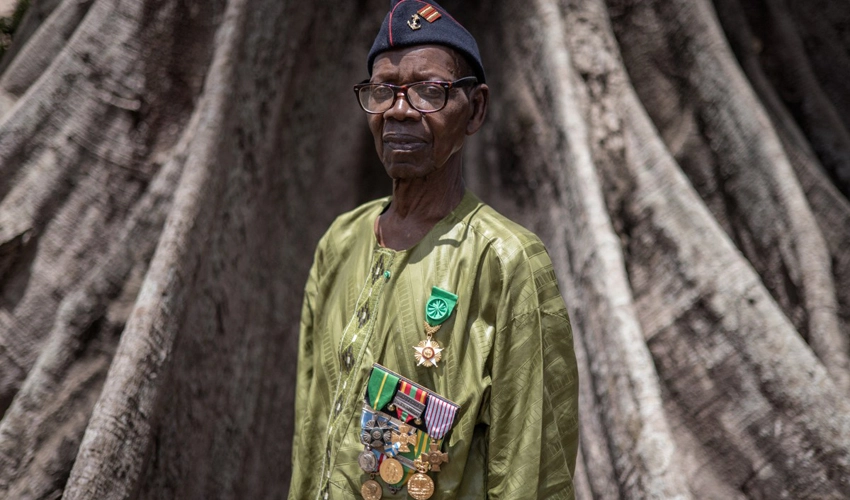Senegal ex-rifleman in his 90s to carry Olympic torch in France

BADIANA, Senegal (AFP) - At over 90 years old, former Senegalese rifleman Oumar Dieme considers it something of a miracle that he will be carrying the Olympic torch as part of the opening of this summer's Paris Games.
In the shade of mango and silk-cotton trees, he recounts his time in the "Senegalese tirailleurs" -- a corps of African infantrymen who fought for France during the two world wars and various decolonisation struggles. Dieme's medal-adorned traditional boubou speaks of his service in former French Indochina and later Algeria, as he recalls those who never returned to their homeland.
"Many colleagues stayed behind. Others came back mutilated (or) are no more," he said, his blue cap pinned with a sergeant's rank. Dieme explained that some 20 men from his village of Badiana in the southern Casamance region served in the Senegalese Tirailleurs corps until it was disbanded in the 1960s. He added that he was one of the "lucky" ones.
"I'm the only survivor. It was a miracle that I was chosen," he recounted, surrounded by family members and crumbling buildings. Dieme has been selected as one of the torchbearers to carry the Olympic torch as it passes through the Parisian department of Seine-Saint-Denis for the opening of the Games at the end of July.
Organisers accepted the bid from the department, where Dieme lived before his return to Senegal in 2023. "The choice of Oumar Dieme contributes to the essential work of remembrance, because the Senegalese riflemen have been forgotten for too long in our collective memory," Stephane Troussel, president of the Seine-Saint-Denis department, told AFP.
Dieme had never heard of the Olympic flame before, but agreed anyway. "Given my age, I would like to be accompanied by my son," he said.
Independence
Dieme is one of thousands of soldiers born in the former French colonies in Africa to have fought in the Senegalese Tirailleurs corps, created in 1857. He enlisted on March 6, 1953, after leaving neighbouring The Gambia where his father, an imam, had sent him to study the Koran. Recruiters gave Dieme the birth date of 31 December, 1932, making him 20 at the time, but he thinks he is at least two years older.
He volunteered to go to Indochina, where US-backed colonial ruler France was fighting the Chinese-backed Viet Minh independence movement. He had seen "people come back with medals and decorations, I liked that," he said. Dieme recounted how he saw 22 men from his company fall in an ambush, and how the encirclement of Dien Bien Phu had prevented him and his colleagues from getting there before the decisive defeat of the French Union troops in 1954.
After returning to his home country, Dieme left again in 1959, this time headed for the Algerian War. It was here that he first learned of Senegal's own independence from France in 1960. Dieme was repatriated and re-enlisted in the Senegalese army, before retiring at 36 and working as a security guard at the University of Dakar and as a bank courier until 1988.
'Beautiful symbol'
Dieme later settled in Bondy, northeastern Paris, where he and other former riflemen faced another battle, this time with the French state. He eventually obtained French nationality, and in 2023 the government allowed the remaining tirailleurs to continue receiving the minimum pension without having to spend half the year in France.
Dieme later returned to Senegal, where he splits his time between his village and the capital Dakar, where one of his two wives and the mother of many of his children lives. "I'm very happy to be with my family. (In France) I was confined to a 17 square metre room. I didn't see anyone. In this village, everyone loves me," he said with a wide grin.
Dieme's opportunity to carry the Olympic torch is testament to the efforts of Aissata Seck, a local councillor in Bondy and president of a group commemorating the tirailleurs. "It's a beautiful symbol, even more so today with the extremely difficult current situation and the trivialisation of racism on social media. It shows the richness and diversity of France," she said.







